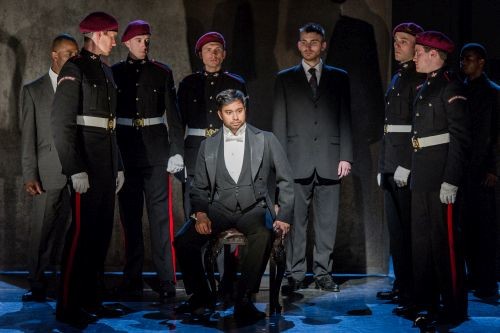 United Kingdom Edinburgh International Festival 2014 (11) – Britten, Owen Wingrave: Soloists, Choristers of Chelmsford Cathedral, Britten-Pears Orchestra / Mark Wigglesworth (conductor), King’s Theatre, Edinburgh, 15.8.2014 (SRT)
United Kingdom Edinburgh International Festival 2014 (11) – Britten, Owen Wingrave: Soloists, Choristers of Chelmsford Cathedral, Britten-Pears Orchestra / Mark Wigglesworth (conductor), King’s Theatre, Edinburgh, 15.8.2014 (SRT)

Cast:
Owen Wingrave – Ross Ramgobin
Spencer Coyle – Jonathan Summers
Lechmere – Isaiah Bell
Miss Wingrave – Susan Bullock
Mrs Coyle – Samantha Crawford
Mrs Julian – Janis Kelly
Kate Julian – Catherine Backhouse
General Sir Philip Wingrave – Richard Berkeley-Steele
Ballad Singer – James Way
Production:
Neil Bartlett (director)
Simon Daw (set designer)
Sue Wilmington (costume designer)
Ian Scott (lighting designer)
Owen Wingrave is probably Britten’s least popular opera (I go into some of the reasons why here) but it has had a few notable performances and recordings in the last few years so maybe it’s beginning to come into its own. Its themes of individual courage and solidity of response to war perhaps resonate more with our times, and the work’s overt pacifism, preachy as it is, certainly fits in with the Edinburgh International Festival’s 2014 theme of Culture and Conflict.
This production, imported from this year’s Aldeburgh Festival, assembles what turns out to be a crack team of Britten musicians. The anchor of the piece is the exquisitely focused orchestral sound of the players of the Britten-Pears orchestra (whose playing knocked me sideways in their Peter Grimes recording), playing David Matthews’ reduced orchestration, which effectively works out at one player per part. They sound shimmering and subtle throughout, but they can conjure up the correct level of violence when required, and Mark Wigglesworth controls the dramatic ebb and flow with expertise and excitement.
Ross Ramgobin is first rate as Owen, his voice beautiful yet muscular and full of youthful energy. Catherine Backhouse is a lustrous, sultry Kate, making it easy to see why Isaiah Bell’s impetuous Lechmere falls for her. The pick of the older singers is Susan Bullock, having a whale of a time as Owen’s terrifying aunt, bringing all the necessary waspishness to the character but without turning into a parody, something Richard Berkeley-Steele’s Sir Philip didn’t avoid quite as successfully. The Coyles were very well taken, particularly by Jonathan Summers who embodied the arc of the one character in the opera who genuinely changes during the action, and doing so with rich, authoritative tones. In a nice touch, the wheelchair-bound Sir Philip’s nurse doubled as the ballad singer at the start of the second act, and he sang the ghost story both beautifully and compellingly.
I didn’t much care for Neil Bartlett’s production, though. The 19th century costumes set the action at the time of Henry James’ original story, but the sparser set and the use of movable flats is more reminiscent of a school play than a professional production, the gain in fluidity not outweighed by the loss of visual impact. Furthermore, his main idea of having “The Dead” standing mute on the side of the stage for most of the action fell flat because they had so little to do, save embarrassingly to strike some aggressive poses and to recreate the story of the elder Wingrave’s killing of his son. Had they been absent from the stage entirely there would have been no dramatic loss, and it’s a shame that he didn’t do something more dramatic with the concept.
This is still worth catching for the musical values alone, though, and you can see one more performance on Sunday 17th August. In a festival that is ever more starved of opera productions, you should take every opportunity you can get.
The Edinburgh International Festival runs until Sunday 31st August in venues across the city. For full details click here.
Simon Thompson

